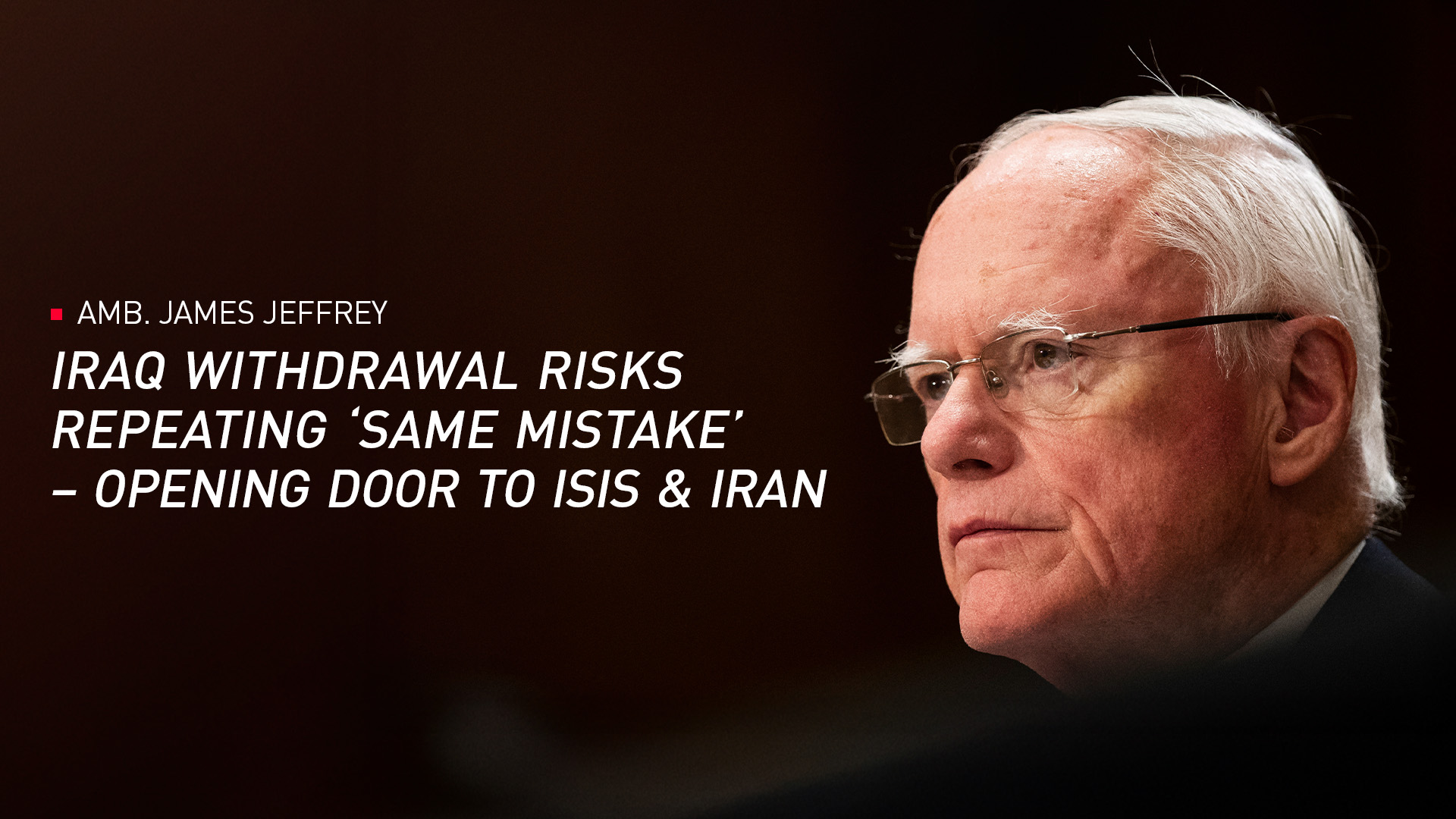Former U.S. Envoy Warns Troop Withdrawal from Iraq Risks Repeating ‘Same Mistake,’ Ceding Ground to ISIS and Iran
Former U.S. envoy James Jeffrey warns that the U.S. troop withdrawal from Iraq is a repeat of the 2011 'mistake,' risking an ISIS resurgence and increased Iranian influence while destabilizing the region and threatening key U.S. interests.

ERBIL (Kurdistan24) – A complete withdrawal of American military forces from Iraq risks repeating the strategic errors of 2011, potentially creating a vacuum that could be filled by a resurgent ISIS and emboldened Iranian influence, a prominent former U.S. diplomat has warned.
In a wide-ranging interview with Kurdistan24, Ambassador James Jeffrey, who served as U.S. Ambassador to Iraq and Türkiye and the United States Special Representative for Syria Engagement and Special Envoy to the Global Coalition to Defeat ISIS, expressed grave concern that the departure of U.S. troops could destabilize Iraq and the wider region, undermining years of security gains.
Speaking live from Virginia, Jeffrey cautioned against underestimating the dual threats facing Iraq, arguing that the American presence has served as a critical bulwark for the country’s stability, sovereignty, and democratic path.
“Iran is a threat to the region,” Jeffrey stated, emphasizing that “U.S. forces in Iraq have helped the country remain stable, remain free and democratic, remain out of the hands of either Daesh or the Iranians.”
While acknowledging that some Iraqi authorities welcome the departure of coalition forces, he urged the U.S. administration to negotiate a continued presence.
Without American troops on the ground, Jeffrey fears a dangerous regression. “We will have a security relationship after the troops leave, but we had one after 2011 as well,” he remarked. “Without American troops and the ability to fight enemies of both America and Iraq, I am concerned that we are making the same mistake again within a little over a decade.”
The former special envoy painted a stark picture of the persistent threat posed by ISIS, highlighting the group’s proven resilience. He argued that the fight is far from over, pointing to the ongoing U.S. military commitment in neighboring Syria as evidence of the terrorist organization’s tenacity.
“ISIS has shown an amazing ability to reconstitute,” Jeffrey said. He noted that even with America’s “best, most elite troops” and significant air power deployed in Syria for a decade, the group remains active in the Badia desert and its leadership structure persists in Idlib, as evidenced by a recent U.S. raid.
Recalling the group’s origins as al-Qaeda in Iraq, which exploited the Syrian civil war to build a so-called caliphate, he stressed that the ongoing instability in Syria provides fertile ground for its revival. “As long as [Syria] remains unstable, there's a chance that ISIS can grow once again, threaten Iraq, threaten Syria, threaten Türkiye, threaten Jordan,” Jeffrey explained.
From a strategic standpoint, the former diplomat questioned the logic of withdrawing a relatively small and effective force that comes at a minimal cost in terms of finances and casualties.
“I generally do not believe that it makes sense to withdraw small numbers of US troops who do not cost us much money,” he asserted. “We have almost 2 million troops under arms. We can afford a few thousand here and there. We're doing good work and not suffering significant casualties, which is the case.”
Beyond the counter-terrorism mission, Jeffrey was candid about the geopolitical role American forces play in balancing regional power dynamics, particularly concerning Iranian interference.
He described the U.S. military presence as functioning “unofficially, but importantly as a balance, as a barrier” to Tehran’s influence in both Baghdad and Damascus. The desire by some factions in Iraq to see American forces leave, he suggested, is directly linked to this function.
Turning his attention to Syria, Jeffrey clarified the objectives of the U.S. mission there, stating it is primarily focused on defeating ISIS and promoting stability, not nation-building or creating autonomous zones.
He praised the Syrian Democratic Forces (SDF) as an “extremely effective force” and an essential partner in the ongoing fight against Daesh. However, he underscored that the U.S. is committed to a unified Syria and is not working toward the creation of a separate state in the country’s northeast.
“We never went into Syria to create a separate state in the northeast, and we will not do so,” he stated firmly.
Instead, he said Washington is actively supporting efforts to stabilize the country and is working with the SDF and the Autonomous Administration on implementing agreements reached between General Mazloum Abdi and Syrian President Ahmed al-Sharaa.
Addressing the impact of a potential withdrawal on America’s strategic allies, particularly the Kurds, Jeffrey acknowledged the deep historical ties.
“We will continue to have a very special place in our hearts for our Kurdish friends in Erbil and Sulaimani and the Peshmerga who fought so well against Saddam and then against Daesh when many others were retreating,” he said, extending similar sentiments to the Kurds of Northeast Syria.
He described the challenge as maintaining a “delicate” and “not easy” balance between ensuring the rights of Kurds and preserving the territorial integrity of a unified Iraq and a unified Syria. This complex diplomacy, he noted, also involves working with Türkiye, which has significant interests in the region.
“We believe we can do it,” Jeffrey affirmed, pointing to the relative success in Iraq achieved with the help of both the Iraqi people and the Kurdistan Regional Government.
Finally, the former envoy linked regional security directly to vital American and global economic interests. He identified Iraq, with its vast energy reserves in both the Kurdistan Region and the south, as one of the world’s most important oil producers.
The stability of such a critical player in the global energy market, he concluded, is a fundamental pillar of U.S. policy. “It's important that it stay in hands friendly to the region, friendly to the international community,” Jeffrey said. “And that is a major cornerstone of American policy in the region will still stay so.”
